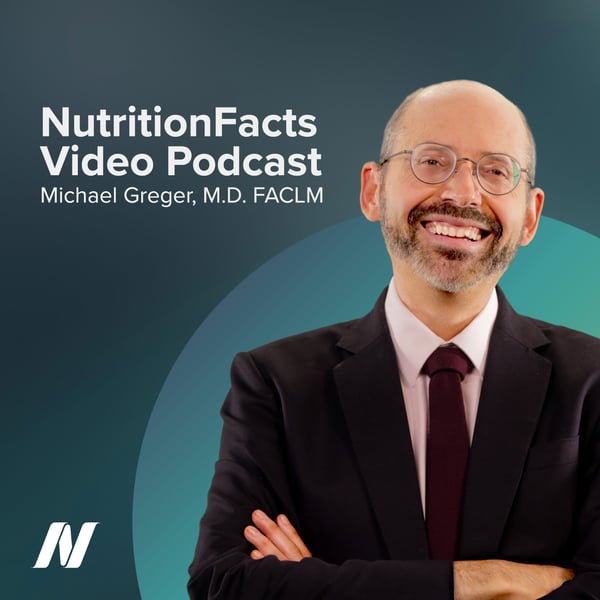Epigenetic Clocks for Testing Your Biological Age
NutritionFacts.org Video Podcast
[email protected]
4.8 • 877 Ratings
🗓️ 28 August 2024
⏱️ 6 minutes
🧾️ Download transcript
Summary
Transcript
Click on a timestamp to play from that location
| 0:00.0 | My book How Not to Age is all about the mechanisms of aging and how we can affect them through diet and lifestyle. |
| 0:06.0 | Can looking at epigenetics, modifiers of gene expression help predict our health span and lifespan? |
| 0:13.0 | Watch to find out. |
| 0:19.0 | Epigenetics. |
| 0:23.6 | The differential expression of genes both establishes the character and function of a cell |
| 0:28.6 | and maintains that identity over time through round after round of cell division. |
| 0:33.6 | So our heart cell stays a heart cell and divides to make more heart cells instead of skin cells or kidney cells, |
| 0:40.3 | even though all of our main cells have the same entire complement of DNA to potentially be anything. |
| 0:47.3 | This is accomplished by methylation, chemical markers that silence inappropriate genes in a particular cell. The fidelity of that |
| 0:56.0 | maintenance of methylation is good, 97% to 99.9% every division, but not perfect. Over time, |
| 1:04.0 | those tiny errors may add up and may help explain why the methylation patterns of identical |
| 1:10.0 | twins drift apart as they age. |
| 1:12.6 | The epigenetic markers of young identical twins are essentially indistinguishable, |
| 1:17.6 | but then diverge over time. |
| 1:19.6 | Identical twins have the same DNA, the same genes, |
| 1:23.6 | but the difference in gene expression among older identical twin pairs were found to be |
| 1:29.3 | about four times greater than those observed in young pairs. |
| 1:34.3 | This may result in them each getting different diseases. |
| 1:37.3 | An age-related disease like Alzheimer's only has an identical twin concordance rate of about 50%, meaning if one twin gets it, there's only about a coin-flip chance that the other will too, despite identical DNA. |
| 1:52.0 | Or even if they do both get it, the disease may manifest decades in part. |
| 1:57.0 | Any epigenetic differences that may contribute to differential disease rates may arise |
| 2:02.7 | from having different diets and lifestyles, or maybe a result of random epigenetic drift. |
... |
Please login to see the full transcript.
Disclaimer: The podcast and artwork embedded on this page are from [email protected], and are the property of its owner and not affiliated with or endorsed by Tapesearch.
Generated transcripts are the property of [email protected] and are distributed freely under the Fair Use doctrine. Transcripts generated by Tapesearch are not guaranteed to be accurate.
Copyright © Tapesearch 2025.

